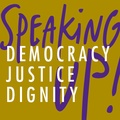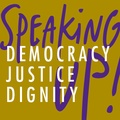Read Part 1 >>
Where, dear Goddess, on the arid landscape of the battle of words, does caring lurk? How, dear Cherry Tree, can we come to the place of caring? Is it in the flight of the wisp through curtains of stone words?
It is, she tells me in the spaces between words and stones, in the spaces within sound and no sound. Caring comes to walk with us in the cracks of the day and the night, as we stumble, as we fall, as we rise again. Caring is present at all times in all places in every dying and birthing, whoever we are, whether we know it or not. And in the wailing of the wisps at the walls of stones, prayers break through.
The arms of Caring are taut. With one hand, She holds the one who is hurt. With the other, the one who harms. She does not let either go. She is the bridge between us and the ones we do not yet love. I have it on Her authority that She endures forever.
* * *
I did not know, dear Tree, that on the way to Nagasaki we would be stopped at Nanking. Stopped and trapped here, in the most unholy, the most unbearable of times.
Since that conversation, Iris Chang’s book has fallen into my hands and I’ve fallen into quicksand, a thick and coiling force. This nameless place.
Dear Iris Chang: I cannot continue reading your book. I cannot stop reading your book. On the railroad tracks fourteen floors below, a small animal, not cat, not dog, something wild, low-slung, thick-tailed, moves across from one small wilderness of trees on the south side to the north. The south—untouched, bushy-treed area that has been ignored by the city for so long—is now being beautified and a tractor has mowed through it and planted tame trees where once the wild ones were. The animal is a refugee, looking for another safe haven. It doesn’t know, as I do, that the habitat on the north side is also doomed. Yet another highrise condominium will claim nature’s tiny domain.
At the moment a black, long-tailed animal and a smaller grey one are trying to navigate the tracks. Squirrels, I suppose. No doubt there are others that have attempted the odyssey. The forces of development are stronger than anything one person can do to save a few wild animals and we cannot do everything or react to every impulse that scrabbles at our hearts.
I’d thought my task was to get to Nagasaki. I’d thought the way was to be gentle. But the road is strewn with mountains of corpses.
Although I’ve put your book down, Iris Chang, I cannot will away your words. I cannot turn my mind’s eye from the pictures. Indescribable pictures. It was not just a handful of aberrant sadists and torturers that gang-raped young girls to death. There were, according to the International Military Tribunal for the Far East, an estimated twenty thousand women and girls of all ages raped, including the elderly and infants. We do not know how many people were killed in Nanking—two hundred thousand, or twice or half as many.
“Does one hundred thousand make it better, make it less horrific, than two hundred, four hundred thousand? Two million?” Marjorie asked. “All this argument about numbers!”
According to Ben Kiernan, there were up to twenty million civilians killed in Asia between 1931 and 1945 by Japan’s military.
It’s utterly beyond comprehension. Here’s another photograph on the internet. A little boy stands with his hands raised in surrender among rows of men, all their hands raised. A little Chinese boy. Ten. Twelve. This one child. If he was mine, if he was yours, he would matter more than the whole world.
From a survey done by one of the daily papers in England, we learn that the single most important historical event in the last one hundred years, in the opinion of the majority of respondents, was the death of one person. One beautiful young woman. Princess Diana. There were thousands of Princess Dianas in Nanking. The more beautiful you were in Nanking in 1937, the more you were raped.
It was unbridled evil, a friend said. But the word “evil” hangs in the air and blows about without a connection to anything I can take in. Beloved sons, decent fathers, brothers, uncles, born and raised in a culture steeped in honour, did things that defy description. I will leave it all there, in my numbed and bewildered state and leap to another word. Good.
It is not often one hears the word “good” associated with the word “Nazi.” In the worst of the worst of that for which there is no word, goodness remains unextinguished and surprising. Iris Chang uncovered the story of “the living Buddha of Nanking,” “the Oskar Schindler of China,” the Saviour of thousands and the head of the Nazi party in Nanking. John Rabe was good. The world needs good Nazis, good Ku Klux Klansmen, good pedophiles and murderers and other categories of “evil-doers.” John Rabe headed the International Safety Zone, in which thousands were shielded. He witnessed. He recorded. And although he was silenced when he returned to Germany, his diaries endure.
Robert Wilson, born of missionaries in Nanking, with a scholarship to Princeton at 17, was also an extraordinarily good man, a heroic doctor and the only surgeon in all that hell. He was one who stayed with the people while others fled. He saw the worst. He never rested.
The third foreigner mentioned in Iris Chang’s book is the one who will not let me go. She was known as the Goddess of Nanking. Her name was Wilhelmina (Minnie) Vautrin, an American, born in 1886 in Illinois, a missionary, an educator at Ginling College for women. She also saved thousands of lives. Her diaries also endure.
1937. "Tonight a truck passed in which there were eight or ten girls, and as it passed they called out ‘Jiu ming! Jiu ming!’—save our lives…”
“Jiu ming! Jiu ming!”
“How ashamed women of Japan would be if they knew these tales of horror."*
Notes:
1. Wikipedia
* “From Gently to Nagasaki” will be published in The Asian American Literary Review, Issue 2. AALR is a not-for-profit literary arts organization. To learn more about it or purchase a subscription to the journal, visit online at www.asianamericanliteraryreview.org, or find them on Facebook.
© 2011 Joy Kogawa






